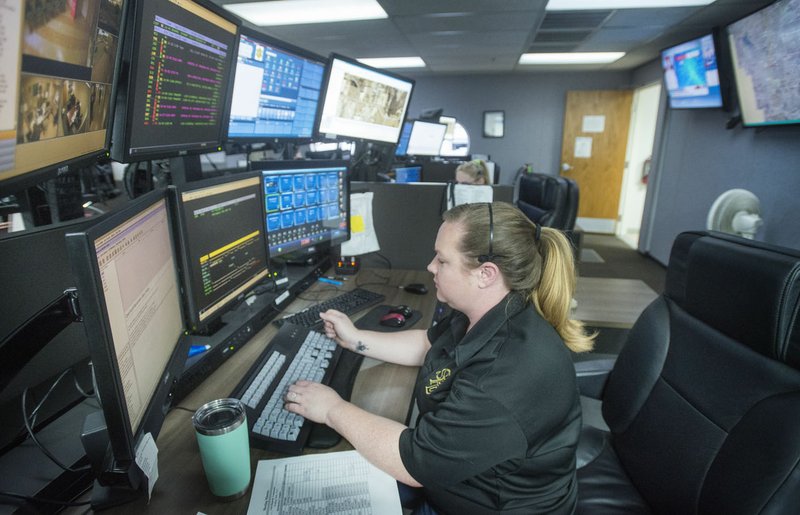SPRINGDALE -- Each of the four dispatchers on duty at the Springdale Police Department sits in front of a bank of seven computer screens. They can show the location and status of all emergency units, a map for the locations of 911 calls, cameras inside the department to watch officers as they bring in prisoners, even a list of burn permits issued for the day.
But the main screen displays a weak link: the computer-aided dispatch system, which has been in place since 1994.
By comparison
Springdale dispatch
• Dispatches police department, fire department, emergency medical services
• CAD system online 1994
• Calls worked in 2017: 181,400
• Calls worked in 2018: 103,156
• Calls worked per day: 800, both inbound and outbound
• Dispatchers employed: 20
Source: Teresa Hudson, dispatch manager
Fayetteville dispatch
• Dispatches police department, fire department and after-hours city calls
• CAD system online in February 2017
• Worked 63,773 calls in 2017
• Worked 41,361 calls in 2018
• Employs 19 dispatchers
Source: Kathy Stecker, dispatch manager
"It doesn't do the things that are needed today in a public safety environment," said Fire Chief Mike Irwin. "We know what the issues are, and now we are looking at how we overcome them."
The city is looking to replace and upgrade the software, and city officials are meeting with vendors for product demonstrations.
When a call comes in, the dispatcher enters by hand information given by the caller or another computer system -- the typing callers hear in the background, said Teresa Hudson, the city's dispatch manager.
As information is checked and cross-checked, the dispatcher radios a response unit, telling the first responders to pick up a call listed on the vehicle's computer. The dispatcher also sends information about the call to the computer.
The current dispatch system works, but not as well as it could, city officials said. A new system could improve response times for the police, fire and medical units the city dispatches.
A cost for the city's new computer-aided dispatch system won't be known until its chosen, said Wyman Morgan, the city's director of finance and administration. The city will pay for the new system from the Capital Improvement Fund, he said.
Once purchased, the city probably will get the new system online as quickly as possible because it's needed, he said. The programming easily will transfer to the new city administration, courts and police department building approved by Springdale voters in the February bond issue.
Dispatchers record about 800 calls daily, both inbound and outbound to officers, the coroner, the street department and others as needed.
The current computer-aided dispatch system uses a grid, Irwin said. If a call comes from anywhere in that grid area, an emergency responder assigned to the grid gets the call. But that unit might not be the closest to the emergency. One might be working just over the line of the grid, but it wouldn't get the call from the computer.
Springdale police, fire and medical responders usually step up, with the closest unit contacting dispatch and taking the call, Irwin said.
With a new computer-aided dispatch system, a GPS system would find and dispatch the closest responder, Hudson said.
A new system also would allow dispatchers to attach other information to the call that would help those on the street such as warrants, orders of protection, maps, business ownership, weather and road conditions. Dispatchers in other area cities might have similar information in their data banks, but the Springdale program currently can't access those or reciprocate with information.
And the Springdale police officers on patrol don't have access to the state and national crime information systems.
"We are the only ones in the state still using this system," Hudson said.
Nor can the dispatchers add information to a case another dispatcher has open on a screen, she said. For example, the center will get many calls from bystanders for a big wreck, perhaps with different information for a different responding agency.
The current system also doesn't grow with the city. New subdivisions must be built into the system by hand, rather than just circling the location on a map to import, Hudson added.
The Police Department faces another hurdle: records management. Crime reports required by the state must be entered by hand, Hudson said. The department works with a backlog -- currently to 2015.
The city has survived with the outdated system as updates are added almost annually, Morgan said. "But once you reach a point, you are limited in how much you can put on a frame."
The company that originally installed the system has been sold several times, and maintenance becomes harder and harder to get, said Police Chief Mike Peters.
"It's pretty antiquated," Peters said. He explained the system does not work with a modern operating system, is not Windows-based and even has a "green" screen instead of today's "blue."
"We've got our money's worth," Hudson said of the 21-year-old system, which has been with the department longer than she has. "We've gone as far was we can go."
Irwin and Peters shared the situation with the City Council on Monday night. A peer review visit from the Commission on Fire Accreditation International, which granted the department's first accreditation in August, noted the deficiencies, too, Irwin said.
"We've put them behind the 8-ball and not keeping them safe by not keeping the system up to date," said Councilman Rick Culver, chairman of the city's Police and Fire Committee. "We've got to replace it."
NW News on 09/10/2018

